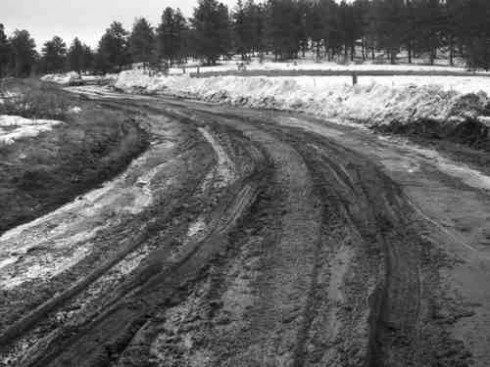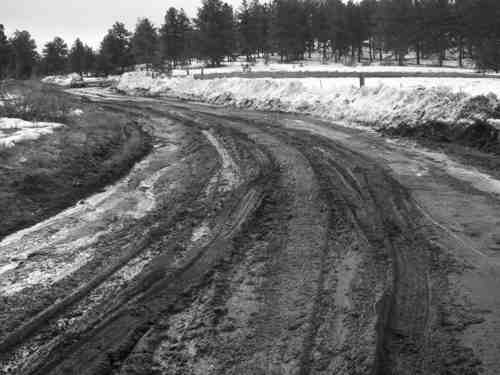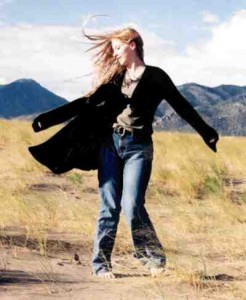Column by Hal Walter
Local Roads – April 2007 – Colorado Central Magazine
THE WINTER FROM HELL has become the mud season from hell. It’s been reported that a neighbor yanked the front end off another vehicle trying to pull it out of the mud.
I tend to believe this story, considering that the last 100 yards of my road is a veritable quagmire. My truck sinks nearly to the hubs if I try to drive out of here in the mid-afternoon. It spins in the goo and just inches its way along until it hits dry ground. We don’t even attempt this in the Subaru for fear the car and its occupants may never be seen again.
By the way, this is the condition of the road after a county grader was employed on it for more than four hours the other day.
In a timely decision, Custer County commissioners recently approved a fall ballot measure asking local voters to approve a tax increase. The money would specifically be earmarked for the road and bridge department to improve the condition and service to the county’s roads.

The new tax would generate a predicted $375,000 in road funds, and would cost most area property owners between $40 and $80 a year, according to reports in the Wet Mountain Tribune.
This sounds perfectly reasonable to me, but then I believe in paying my fair share for public services. I’d offer to pay even more for improved roads, which frankly have deteriorated greatly in the last decade since Custer County was “discovered” by the people of money, some of whom apparently don’t think they should have to pay for things like roads.
In fact, I’ve lived here 16 years and the roads have never been in worse condition.
Back in 2005, a similar ballot issue to raise money for the roads was resoundingly defeated. In such a heavily Republican county this isn’t surprising, since many so-called “conservatives” seem to think they should not have to pay taxes. The idea of a social contract to cover things like roads and helping thy neighbor apparently was never learned in school or Sunday school. Corporate welfare is another story altogether, but I digress.
To get back to the issue of roads, this rather selfish notion of the world just doesn’t make any sense. I would venture the average Custer County trophy-home owner spends more than $80 at the car wash trying to keep his Land Yacht clean. And what of wear and tear to the vehicle? What about safety? What about the basic convenience of having passable roads? Can we put a value on these amenities that might be more than $80?
I can.
In fact I think the commissioners’ fundraising proposal does not go far enough. I have two more money- raising suggestions and I’m not talking about a bake sale. First the county should seriously consider doing away with agricultural property-tax status for residential subdivisions, or at least develop a more equitable tax system for those who are “ranching” 35-acre parcels.
Second, the county should institute a sales tax on all real-estate sales to cover not only roads but also other eventualities of growth such as improved schools, law enforcement, fire protection, medical clinic and ambulance services, and the library.
The agricultural property tax system is currently being abused. Here is how it works. Property owners in upscale subdivisions lease their land to ranchers for a minimal fee, agreeing to not fence their properties or to merely keep their gates open during the months that the cattle are on the range. Around here, this generally means May through October. By doing this they maintain their agricultural land status and get a sizable discount on their property taxes.
THESE FAUX RANCHING ARRANGEMENTS allow owners of rather large homes in the area to dodge taxes on their land, despite the fact that many of them own no livestock whatsover. They race back and forth (the sheriff has little funding to enforce speed limits out here) to town on the same county roads that I actually pay for, causing increased damage to the thoroughfare. Although I actually am doing something agricultural on my ranchito, I am being taxed at the residential rate. I’m not complaining about my tax load — the point is if I can afford it surely these other folks can.
And then there’s the real-estate industry. As far as I know, real estate is the only commodity, aside from livestock and livestock feed, on which the state and county do not collect sales tax. What other business would be allowed to place such economic demands on a community without being held at least partially financially responsible for it? Incidentally, the aforementioned fake cattle-grazing scams were not the original idea of property owners themselves, but were fabricated by developers to make the property more attractive to buyers.
The bottom line is that there should be a tax on real-estate sales to help cover the costs of growth. The county wants to raise $375,000 by raising taxes on property owners, but that’s not enough. We could raise so much more by taxing real-estate sales. Consider that a typical 35-acre parcel in Custer County is selling for $125,000 or more. A 6 percent tax — roughly equivalent to the commission for a realtor (I always lowercase the “r” because I like getting mail from them) would bring in $7,500. A $500,000 home sale would net the county a whopping $30,000.
It should be noted that what I am proposing is not mindless criticism, but rather truly viable and reasonable solutions that have been used by other counties. This money could be divvied up between the roads and bridge department, the school, hospital and library districts, and other emergency services.
There will be those who oppose such a solution with the claim that it will lower property values, etc. This of course is nonsense. Such a plan — actually providing services and the quality of life that people expect — would actually increase property values in the area. After all, who wants to live at the end of a muddy road like I do?
There will also be those who will say this will slow growth. I’m sorry, but I view that as a positive thing. Especially if we cannot now provide the infrastructure and services needed to accommodate this growth. All I have to do is look at my road to know that we obviously can’t.
For the next two months the roads will be muddy, on and off. When the mud dries up they will gradually become dusty and washboarded. Custer County voters have all spring and summer, and part of next fall, to consider whether spending a little more on taxes might save them a lot of money and hassle when it comes to roads. Unfortunately, I have little faith they will make the right decision.
Hal Walter cultivates prose and burros on 35 acres near the ghost town of Ilse in the Wet Mountains.


